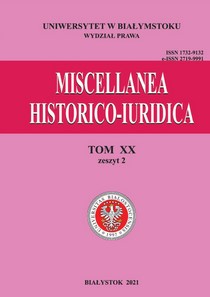Introduction, Decline, and Fall of Socio-Economic Provisions in Yugoslavia’ s Constitutions (1921–1931)
Introduction, Decline, and Fall of Socio-Economic
Provisions in Yugoslavia’ s Constitutions (1921–1931)
Author(s): Mirjana MiškićSubject(s): Constitutional Law, Economic history, Social history, Government/Political systems, Interwar Period (1920 - 1939), Socio-Economic Research, Labour and Social Security Law
Published by: Wydawnictwo Uniwersytetu w Białymstoku
Keywords: Vidovdan constitution; economic and social provisions; Kingdom of Serbs - Croats and Slovenes; Labor Law; Agrarian reform;
Summary/Abstract: The economic and social provisions of the Vidovdan constitution represent its most advanced part. Its introduction was a step forward towards the creation of a socially responsible state. However, their basic goal, increasing the cultural and economic well-being of the people, was not achieved and the economic crisis deepened. In the post-war state, burdened with cultural, religious, and national differences, the democratic constitution did not last long. The author tries to explain the factors that influenced the adoption of these provisions and their (non) implementation. Whether the failure of economic and social provisions was determined by the fate of the constitution or by objective facts is difficult to say. The author seeks to prove that the collapse of the constitution and its economic and social provisions was influenced by a number of unfavorable circumstances, such as the economic underdevelopment of the state, the remnants of feudal relations, political disunity, resistance to the new state, and Serbian hegemony. Using the historical-legal method of research, combined with economic and sociological methods, the socio-economic provisions of the Vidovdan Constitution and their implementation will be analyzed.
Journal: Miscellanea Historico-Iuridica
- Issue Year: 20/2021
- Issue No: 2
- Page Range: 71-85
- Page Count: 15
- Language: English

